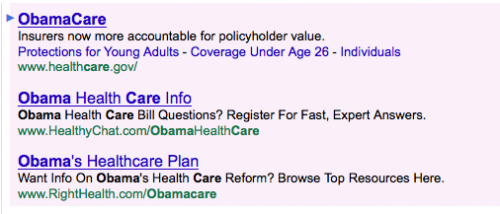Obamacare AdWords: Partisan Outrage Or Public Education?
The phrase “Obamacare” was intentionally concocted by health care opponents to create a negative impression or connotation in an attempt to defeat the program. The phrase stuck and is now widely used by some in the media. That’s all according to Wendell Potter, a former health care industry PR executive who’s written a disturbing book […]
The phrase “Obamacare” was intentionally concocted by health care opponents to create a negative impression or connotation in an attempt to defeat the program. The phrase stuck and is now widely used by some in the media. That’s all according to Wendell Potter, a former health care industry PR executive who’s written a disturbing book about the industry, its tactics and its political allies on the right. Now the term is at the center of a new dispute over Google advertising.
With the new Congressional Republican majority set on trying to repeal health care, the issue has been in the news quite a bit and is spiking as a search query. Type in the term “obamacare” and this page appears on Google:

The top ad leads to landing page that is official government site HealthCare.gov:
Republicans and health care opponents are up in arms over this PPC ad campaign as a partisan use of tax dollars. The conservative publication The Weekly Standard, for example, says the following:
The brazenness of the Obama administration never ceases to amaze. Try typing “Obamacare” into Google, and you’ll find that the first entry is now the Obama administration’s www.healthcare.gov. If you don’t particularly like that result, you’ll probably hate the fact that you’re paying for it.
By contrast the Health and Human Services Department sees it as a form of public education and an effort to combat misinformation being promulgated by opponents (who are also buying PPC ads):
“We are using a bunch of search term[s] to help point people to HealthCare.gov. Part of our online efforts to help get accurate information to people about the new law (i.e. also use Facebook, Twitter, blogs and webcasts),” an HHS official confirmed by e-mail.
Who’s right and who’s not?
In 2004 the Bush Administration did something similar, spending almost $10 million on a TV campaign (during an election year) about Medicare. At the time Democratic Senator Kent Conrad raised a similar objection to the advertising:
“While I strongly support educating America’s seniors about the Medicare changes, these ads amount to campaign commercials disguised as public service announcements,” Senator Conrad says. “They are blatantly political, aimed at getting votes and promoting the Administration’s message. They should have been paid for with Bush’s campaign funds, not taxpayer dollars.” The federally funded advertising campaign was created by the Bush administration’s Department of Health and Human Services (HHS) at a cost of $9.5 million and is currently airing nationally on network and cable television.
Advertising by the government about one of its programs is neither unprecedented nor outrageous. I suppose your point of view about whether this is legitimate education or partisan advertising ultimately depends on your specific political sympathies.
Regardless, it’s a recognition of how important search has become in the public discussion and debate about issues and how powerful it can be in shaping perceptions.
Contributing authors are invited to create content for Search Engine Land and are chosen for their expertise and contribution to the search community. Our contributors work under the oversight of the editorial staff and contributions are checked for quality and relevance to our readers. The opinions they express are their own.
Related stories
New on Search Engine Land

